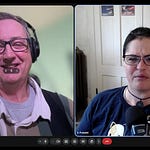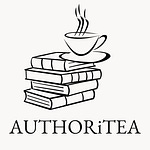Content Warning: This episode has non-explicit discussion of common types of trauma and mentions of them.
Let me start this discussion by being entirely forthright: I have severe CPTSD that has required over fifteen years of consistent therapy for me to manage. I am still healing from some things and still chasing down demons. I come to this conversation as someone for whom these warnings is relevant but also as someone who has written these warnings for my books. My opinion on content warnings is as a member of the community who is affected.
With that said, I also acknowledge and affirm that others in my community have different feelings on this subject than I do. I am not saying they are wrong and I am right. However, I believe also that there are more productive ways to have the discussion than some of the manners I have seen take place online.
What Are Content Warnings?
Sometimes referred to as “trigger warnings” (I will explain the difference in my word usage later), content warnings are lists of things in a book that could cause people to have a deep, emotional response in a way not intended by the author. While the list of prospective content warnings is far too long to provide an exhaustive possible collection, some of the most common are things like sexual assault, abuse, animal abuse, drug use, graphic violence, self-harm, and suicide.
The purpose of these warnings is to allow people to mentally prepare to engage with that kind of content or, alternatively, not engage with something that could be detrimental to their mental health.
Why Content Warnings Matter
This is the part of the conversation where someone inevitably says that they don’t want to spoiler things or that they don’t have to cater to anyone else and so on and so forth. Look, if the FCC puts warnings on things like Law & Order: Special Victims Unit for things like sexual assault and certain types of content they dealt with, I don’t think this is asking a lot of a person.
You also don’t need to make excessive lists though some people choose to do so, and I respect that decision—as well as the compassion behind it. The way I handle it is I put content warnings on my website with two segments: one has spoilers, one does not. That way people can interact with things how they choose. I do not, however, list all my content warnings in my book description because that just causes issues with the algorithm in bookstores.
People who have endured the types of trauma that content warnings help warn of are not “weak” or “soft.” We are often survivors of incredible violence and tragedy. While it is absolutely true that nobody is responsible for my mental health (particularly a complete stranger), the act of warning someone “hey, this has these themes” is a kindness that costs nothing. Particularly if you offer very blanket warnings such as: “This work deals with themes of sexual violence, torture, and harm to animals.” You don’t need to give explicit details, and the people who need to be warned will be warned.
Okay, so What are Triggers?
Let’s first define what a trigger actually is, psychologically speaking, because the term has been so incredibly watered down that it has almost become meaningless. To be candid, that fact really, really pisses me off because it steals language from a community that vitally needs to be able to describe what they experience distinct from other usages.
Being “triggered” doesn’t just mean angry or upset. Being “triggered” means that someone is in incredible psychological distress usually stemming from a flashback (PTSD) or a situation causing their mental illness to flare beyond its usual bounds. This can be something like a person with PTSD being exposed to something that evokes their trauma. It can look like someone with OCD having their routines thrown out of whack and being in meltdown. It can look like someone with severe anxiety being pushed over the edge into an anxiety or panic attack due to something causing their issues to flare up.
In essence, being “triggered” means having your mental illness flare. It can cause meltdowns, self-harm, relapses in people who have addiction problems, or other such things.
There are several categories of trigger, ranging from external triggers (sights, sounds smells, textures that evoke the response) to internal triggers (needing to deal with a situation that is reminiscent), trauma triggers (think how veterans react to firecrackers) and symptom triggers (things like not getting enough sleep triggering a bipolar episode). Every person and condition are different.
For example, myself? Some of my CPTSD triggers are:
Certain songs that I cannot listen to without extreme emotional distress
Certain scents that bring back incredibly traumatic memories
The sound of angry male voices
Scenes of child abuse portrayed “on screen”
Being put into a position of responsibility without having the authority to actually do anything about it
This list is not comprehensive, but you see how specific and personal that is? Do you also see how many of those things would be literally impossible for others to know about me? That said, some of them are pretty common triggers (like the child abuse one).
Why “Content Warning” and Not “Trigger Warning”
As you can see from my above list, trigger warnings are extremely specific and far too unique to be something that I can account for in my books. With trauma, they are often uniquely tied to the specific traumatic event the person experienced and things around it (like the scent of certain perfumes or aftershave, the sound of rain on a specific surface, etc.).
With that in mind, I respectfully submit that it is literally impossible to create a comprehensive “trigger warning” list. There’s just no way to. While I know this may sound pedantic, we are here because we’re talking about books, and as authors, the words we choose are important and should be done with intention.
Instead, I advise the use of content warnings. These are more broad category warnings that don’t get too deep into the weeds because if you start going that way, it becomes an incredibly difficult prospect. With that in mind, I strongly recommend you go the route the FCC went with warnings and cover things like:
Sexual assault
Graphic violence (of any kind)
Child abuse
Child sexual assault (separate from overall assault)
Child death
Miscarriage
Graphic animal abuse (offscreen is far less sticky)
Self-harm
Suicide
Addiction
Graphic depictions of combat
Intimate partner violence
Torture of any kind
While I am sure I don’t have everything on this list, I put everything that came to mind on there. If I missed something you feel I should have added, please leave me a comment letting me know!
But SPOILERS?
Okay, look, I can see the utterly exhaustive list of potential triggers being very spoilery if read. That’s absolutely true (and why I have it on my website under something you have to purposefully click on). However, the above list? That’s not much of a spoiler. Particularly in certain genres (like true crime, for example). If your book includes those themes, it’s also not the kind of spoiler that’ll ruin a story.
Why Am I Responsible for Your Mental Health?
You aren’t.
I’m almost forty, and I grew up in a world without trigger warnings or content warnings on anything except movies, and I read a hell of a lot more than I ever watched movies. Even then, there are plenty of movies that were sprung on me with horrible things I could not have anticipated, and I had deep, guttural reactions to them. Hell, some movies I saw I was warned about and still couldn’t handle certain scenes in (American History X, the curb-stomp scene, for example).
To be entirely frank, I treat content warnings sort of like I treat allergy warnings on food. While no, a content warning won’t usually give someone anaphylactic shock, the psychological equivalent is still just as agonizing. And yes, it can end up with physical injury.
I am not saying strangers are responsible for my mental health. I can of course manage myself. I have for thirty-nine years now. At this point I’d say I’m pretty damn good at it. That said, just because nobody else is responsible for my mental health, that doesn’t mean being kind to people who have endured enough pain in their lives isn’t a worthwhile thing.
After all, if it were you, wouldn’t you want someone to warn you that there was an allergen in your food before you ate it and needed an epi-pen? That’s what this is. And if you just plain don’t care about whether or not someone else suffers because they consumed something without knowing it, well… I think that says a lot about you as a person, and I’d rather we not be friends.











